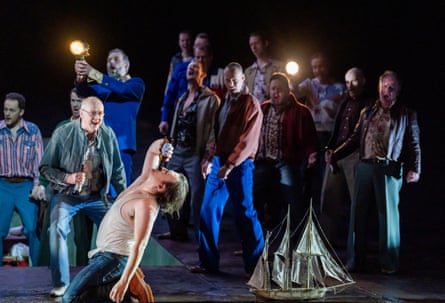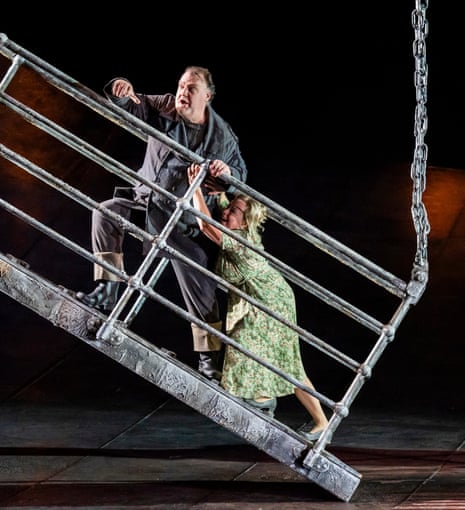Tim Albery’s 2009 production of Wagner’s opera has heaved back into port at the Royal Opera, with the ghost ship of legend once again casting a long shadow over Michael Levine’s set: a huge industrial ship’s deck, curved almost as vertiginously as a skate park half-pipe, over which scurries and slides a crew of oilskinned sailors. And once again the phantom Dutchman himself gets a memorable performance from Bryn Terfel. Vocally it’s not the same performance that he was able to give 15 years ago – he has to push against the orchestra at both the top and bottom of his range now, and his tenderness towards Senta comes across in his look more than his voice – but every word is meaningfully projected, every line full of character. Terfel has owned this role, here and elsewhere, and he’s not about to give it up.
The Flying Dutchman is the work of a composer still in transition, from the established norms of 19th-century opera into the long-form mastery of his later works, and one might expect the odd dip in energy when its two-and-a-quarter hours are performed straight through without a break, as here. Yet even accounting for that, the revival feels slightly lukewarm. With Henrik Nánási conducting, the intensity of the orchestral playing comes and goes. Nánási can be strong on detail but is not consistently so – there are times when the orchestra provides the run-up to a big, bounding voice entry but the two don’t quite join up, and the effect falls flat. The women’s chorus, sung from behind ranks of sewing machines under eye-achingly bright striplights, itself sounds laborious, the rhythms overstressed.

The characters can feel small on this big stage, yet the supporting cast is strong. Stephen Milling’s bluff, healthy sea captain is a good foil for Terfel’s ghostly one. Miles Mykkanen makes a big impression as the clear-voiced but lazy Steersman who sleeps through the Dutchman’s arrival. The tenor Toby Spence makes a convincing character of uptight Erik but this hectoring role doesn’t seem ideal for his voice and he sounds tired by the time he finally gets to sing something lyrical. The male chorus, their ranks swelled with seemingly half the professional tenors and basses in London, sound fantastic.
Best of all, though, is Elisabet Strid, in her Royal Opera debut, as Senta, the self-sacrificing heroine who dreams of something beyond the factory but is doomed to achieve it only in death – and in this production, an anticlimactic death at that. A quietly compelling presence on stage, she sings the role in a soprano that’s golden yet grainy, all slubby silk rather than smooth satin, and the more expressive for it.

Comments (…)
Sign in or create your Guardian account to join the discussion